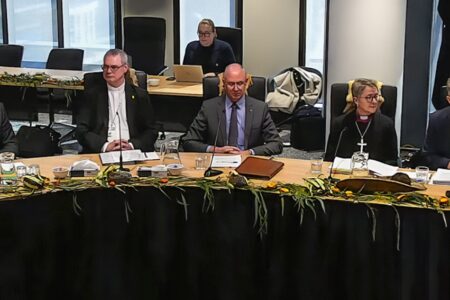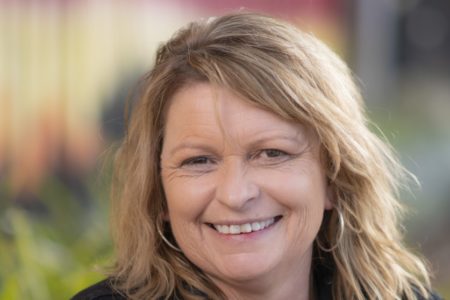By Andrew Humphries
Pilgrim Theological College staff and students kicked off the academic year yesterday with a deep question to ponder.
As part of the college’s orientation, Uniting Aboriginal and Islander Christian Congress Chair, Rev Mark Kickett, answered questions from Assembly President, Rev Sharon Hollis, on the subject of ‘doing ministry on stolen land’.
In introducing the discussion, Acting Head of College, Rev Robyn Whitaker, said it was a confronting subject to consider for those undertaking ministry.
“When we talk about doing ministry and theology on stolen land, we don’t do so to try and make someone feel guilty, but to try and name the realities of the traditions that continue to shape our present, and the present lived reality for our indigenous people.”
In a wide-ranging discussion with Sharon, Mark recounted his background as a Noongar man from Western Australia, the historic and ongoing struggles faced by indigenous people, and how First and Second Peoples might one day walk together.
First, though, Mark said it was important to recognise the trauma indigenous Australians had suffered since colonisation.
“(Many) things were designed to wipe out the Aboriginal people of this country, and there was a term that was used called ‘smoothing the dying pillow’, which suggested that if it continued long enough Aboriginal people would die out,” Mark said.
“We had no voice, but they didn’t count on our resilience and our determination to be who we are with our connection to land and country.”
Sharon said institutions like the Uniting Church needed to accept their own role in what was done to First Peoples over time.
“The Church is complicit in a lot of the stealing that took place, we ran missions in which indigenous people were moved to, and we ran homes that took in children removed from their families,” she said.
“We can’t separate ourselves from the colonial story and pretend that it was someone else doing it, and we are entwined in that story of the dispossession of indigenous people through land, language, culture, custom and ceremony.”
Mark said it was important that Second Peoples recognised that every piece of land told a story to indigenous people, and the importance of finding out that story.
That would be, he said, a step towards ‘doing ministry on stolen land’.
“This leads us towards truth telling and a relationship around reconciliation and justice,” he said.
“I really believe our soul and spirit has been broken following last year’s Voice referendum and if this country is going to find healing in any way, shape or form, it has to do it first with its Aboriginal and Islander people.”
For ministry, said Mark, it meant understanding what Jesus represents to indigenous people and their own stories.
“The Jesus I fell in love with, have come to know and have given my life to, is the one that came and met me as I was as a Noongar man, not as a white version of an indigenous person turned Christian,” he said.
“So it means, in ministry, having an acceptance of all people, because these are the people that Jesus went to see and sat with, ate with and cried with.
“So the question to ask is, ‘how does this transform your thinking and the way that you’re doing ministry?’.
“If you have indigenous people coming into your congregation, it’s about building a relationship with them.
“Listen to them and begin to build that relationship.”
The full discussion between Sharon and Mark can be viewed here



